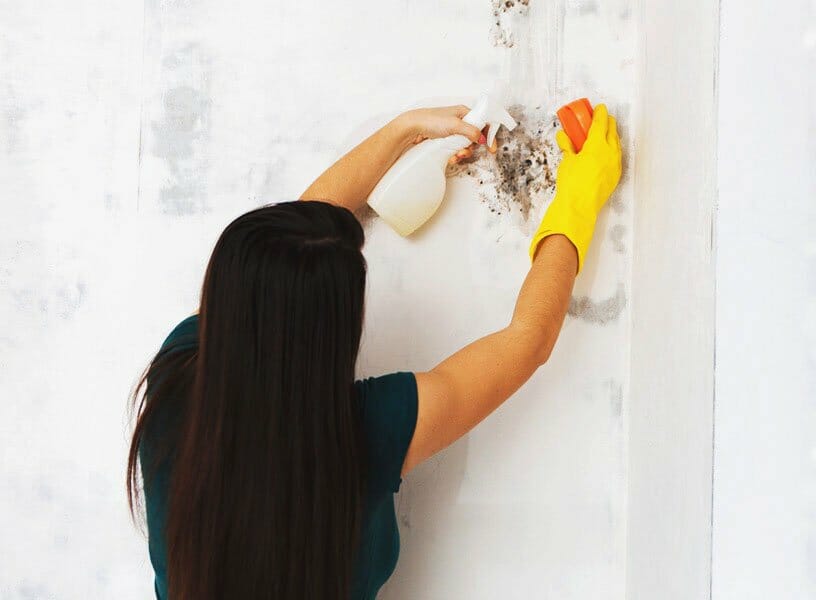Mold can exist in various environments, whether indoors or outdoors, throughout the entire year. Having a small amount of mold in your home isn’t necessarily detrimental, but it’s important to know the right actions to take in case it becomes a serious issue.
Michigan doesn’t currently have any laws regarding mold in rental properties and no local laws regarding mold either. However, under Michigan law landlords have a duty to maintain the unit in a habitable condition.
Keep on reading to learn about landlord responsibilities and tenant rights due to mold in Michigan rental properties.
What we cover
ToggleLandlord rights and responsibilities in Michigan due to mold

There are not any specific laws about mold, but there are building codes and legislative public acts that make sure everyone has safe and healthy housing in Michigan.
Also, livable rental units are free of water leaks and water damage from previous leaks is a landlord’s responsibility. Leaking pipes, roofs, and gutters are a significant contributor to mold accumulation in a home.
If the tenant is convinced that the high concentration of mold in the rental is detrimental to his health can try to recover damages from the landlord. If a tenant can prove in court that the landlord negligently contributed to the appearance of mold at the property, the landlord can be held responsible.
Tenants' rights and responsibilities in Michigan for mold
If you are renting an apartment or house, you have the right to expect a certain minimum standard referred to as a “warranty of habitability” that provides minimum standards of decent, safe, and sanitary housing specified in the state or local housing code.
The responsibilities of the tenant consist of using the provided ventilation systems in both the kitchen and the backroom to reduce the condensation from cooking, running the dishwasher, and hot baths and showers.
Mold disclosure laws in Michigan
Michigan disclosure law requires sellers of residential buildings with up to four units to disclose any environmental hazards on the property while recommending that buyers obtain a professional inspection that may, among other things, uncover evidence of mold (Mich. Comp. Laws § 565.957).
On the other hand, the state of Michigan doesn’t have any statutes or regulations that require landlords to disclose high concentrations of mold in rental properties to prospective tenants.
How long does the landlord have to fix something in Michigan?
For all residential properties, landlords are required to make and pay for any repairs to make the unit livable, unless the mold and damages are caused by the tenant.
Sending notice
Tenants may request repairs orally or in writing. The landlord will then have 24 hours for emergency repairs or the so-called “reasonable” time to make any other repair, including mold, after receiving the notice.
Additionally, tenants are not required to give the landlord access to the property to make the necessary repair under Michigan law except in an emergency. For non-emergency repairs, the tenant must be given notice of a reasonable time before the landlord plans to enter.
Note: See the full list of states and mold laws here
Can I withhold rent and break the lease in Michigan due to mold?
It does not matter at all what is written in the lease agreement, Michigan landlords are bound by the implied warranty. This legal doctrine empowers tenants to withhold rent and in some cases break their lease if they can prove that mold made their apartment uninhabitable.
Of course, these two options should be the last things to do when mold problems occur. The best is to notify your landlord and try to solve the problem in a friendly manner. After all, combating mold is the shared responsibility of both landlord and tenant.
Can tenants sue for mold in Michigan?
If you can prove that the landlord breached his/her duty to protect your health and safety and has violated the rental agreement you can seek justice in court.
You can hope for success from suing for mold in Michigan if the mold damage and exposure were caused by the landlord’s negligence. Before reaching for a trial, remember that you as a tenant have a responsibility to do everything necessary to prevent mold.
Collect all necessary evidence to support your case because suing for mold in Michigan could be tough.
Tenant relocation due to mold in Michigan
Generally, tenants need to be relocated in case of serious mold and uninhabitable dwellings. If the mold is not caused by the tenants, landlords will be required to remediate the mold at their expense. The lease terms and the laws of applicable jurisdiction will determine who will cover the costs of eventual relocation.












